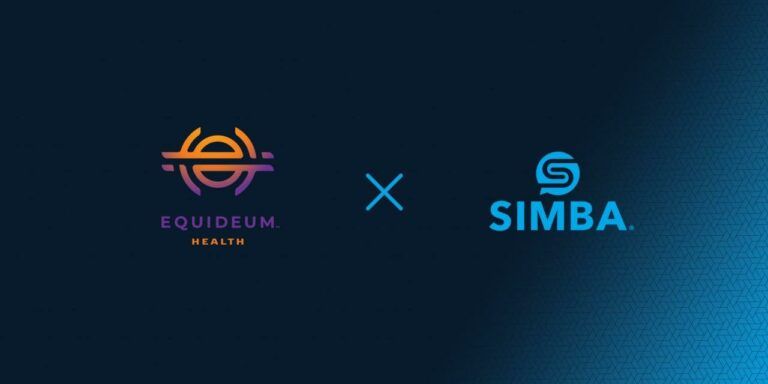SIMBA Chain and Equideum Health Announce Partnership To Build Web3 Health Data Exchange
South Bend, Indiana, 20th July, 2022, Chainwire
SIMBA Chain is announcing a new partnership for the global healthcare and life sciences industry with Equideum Health, the Web3 and blockchain-powered health company formerly known as ConsenSys Health. The collaboration aims to significantly enhance global healthcare by building a decentralized marketplace, dubbed the Equideum Exchange, for empowering individuals to monetize health and health-relevant data about them.
Integrating SIMBA Chain’s cutting-edge blockchain solution SIMBA Blocks with Equideum Health’s Elevated ComputeTM platform will greatly accelerate both cross-blockchain interoperability and the incorporation of healthcare and life sciences supply chain data into the new Web3 data economy enabled by the Equideum Exchange. The development of the Equideum Exchange is expected to conclude by Q1 2023 in collaboration with Equideum Health’s current partners Nokia, Nokia Bell Labs, Microsoft, Intel, and ConsenSys. Users of the Equideum Exchange – including pharmaceutical and Medtech companies, and public and global health authorities – will be able to procure data and privacy-preserving analytic compute results for clinical, population health, health economics, patient-centered outcomes research, and machine learning purposes. These users will be able to access a growing array of high-integrity, longitudinal data resources unavailable today, accompanied by the fine-grained, verifiable, and enforceable consent and economic participation of the individual data subjects.
The integration of SIMBA Blocks enables Equideum Health to achieve cross-blockchain protocol interoperability across its health data applications seamlessly and with significant cost savings. All user data provided remains completely decentralized and anonymous unless a user explicitly consents to be identified, while users also have the option to set certain conditions for the use of their data, such as time limits or purposes, which are ensured through smart contracts and Equideum Health’s enterprise-facing consumer-centric data policy verification and enforcement tools.
The health data platform is part of Equideum Health’s advancement of the Health 3.0 paradigm, also referred to as “Ownership Health,” which is an extension of the read-write-own concept of Web3. The vision sees health and health-relevant personal data used to deliver precision healthcare tailored to the data subject and also controlled and monetizable directly by that data subject. This allows individuals to profit economically from transactions involving data about them while curating much higher-quality data with verifiable provenance for scientific and global health purposes.
“We are proud to be part of a big advancement of the global healthcare system powered by blockchain technology. The use of SIMBA Blocks in the Equideum Exchange’s development will provide a secure and trusted environment to build interoperable cross-blockchain solutions for longitudinal health data, automated health claims adjudication, interoperability, online patient access and supply chain management. With Equideum Health as our new lead partner for healthcare and life sciences, SIMBA Chain ventures into a new industry that is expected to yield many valuable projects in the months and years to come,” says Bryan Ritchie, CEO of SIMBA Chain.
“Adding SIMBA Chain as our lead partner for blockchain-based supply chain initiatives unlocks strategic value at a critical moment: the COVID-19 pandemic has aligned healthcare and life sciences leaders across the public, private, and philanthropic sectors on the urgency to re-architect global supply chains for resilience, adaptability, security, and health equity,” says Heather Leigh Flannery, Founder and CEO of Equideum Health. “Further, by integrating our platforms, our partnership addresses one of the industry’s biggest barriers to adoption of blockchain technology: the deep concern that decentralized applications written for one blockchain ecosystem will not be interoperable cross-chain. Instead of remediating challenges with siloed, poorly utilizable data, this could create still more data silos. Our industry continues to contend with the legacy of non-interoperable electronic health records; it is vital that new exponential technology layered above doesn’t compound the problem.”
About SIMBA Chain
SIMBA Chain (short for Simple Blockchain Applications) has simplified blockchain app development by removing complexities involved and making the technology accessible by all, regardless of their blockchain know-how. The platform auto-generates APIs that support both public and private blockchains and is designed for any developer to easily adopt through drag-and-drop smart-contract building. Incubated at the University of Notre Dame, SIMBA Chain allows customers to deploy blockchain applications without spending huge sums of time and resources on hiring consultants or tech experts. Using SIMBA Chain’s cloud-based platform, any developers, companies, universities, among others, can easily build Web 3.0 solutions.
About Equideum Health
Equideum Health (formerly ConsenSys Health), a Microsoft and ConsenSys partner and ConsenSys Mesh portfolio company, builds Web3 person-centered healthcare and research networks called Data Integrity and Learning Networks (DILNs). DILNs feature self-sovereign identity, fine-grained verifiable consents, advanced privacy preservation and decentralized data liquidity across enterprise and individual data silos. DILNs are implementations of the company’s Elevated ComputeTM platform, powered by Ethereum, tokenization, decentralized artificial intelligence (AI), and confidential computing. Equideum Health’s DILNs prioritize populations with uniquely complex healthcare needs and aim to improve population health and clinical outcomes by impacting access, equity, quality, personalization, engagement and empowerment. Learn more at equideum.health.
Contacts
PR Manager
- Simon Moser
- PolyGrowth
- [email protected].io
Source: Read Full Article

